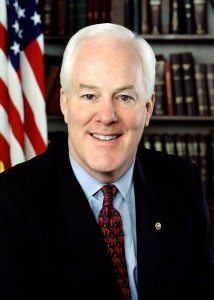 Smart, pro-growth tax reform will expand U.S. investment, increase jobs and wages, and leave more money in taxpayers’ pockets.’
Smart, pro-growth tax reform will expand U.S. investment, increase jobs and wages, and leave more money in taxpayers’ pockets.’
‘We can achieve tax reform without resorting to Obama-era offsets that target energy producers – ill-conceived ideas that would raise the cost of energy investment and put at risk our status as the global leader.’
‘We will continue to work with our Senate colleagues and the Trump administration to ensure that the goals of simplicity, fairness, and growth are captured in tax reform legislation this fall.’
WASHINGTON— U.S. Senators John Cornyn (R-TX) and Bill Cassidy (R-LA), members of the Senate Finance Committee, authored the following op-ed in Forbes addressing how revamping our tax system would impact the energy sector:
Tax Reform To Fuel Economic Growth
Sens. John Cornyn and Bill Cassidy
Forbes
October 26, 2017
https://www.forbes.com/sites/realspin/2017/10/26/senators-cornyn-and-cassidy-tax-reform-to-fuel-economic-growth/#7b644bf860e6
The arrival of autumn brings a once-in-a-generation opportunity to reform our nation’s tax code. American families and businesses are tired of struggling against a broken, out-of-date, tax system. Estimates show that in 2016, U.S. taxpayers spent nearly 9 billion hours and nearly $300 billion preparing their taxes and dealing with the IRS. Tax reform will relieve some of this inefficiency and make our system simpler and fairer.
Tax reform will also help us rise above the weak growth that followed the Great Recession. From 2010-2016, the U.S. economy grew at a meager 2.1% – a stark contrast to prior recoveries, when GDP growth surged. Hourly wage growth has also been muted, which leaves many working Americans still wondering when their recovery is going to arrive. Smart, pro-growth tax reform will expand U.S. investment, increase jobs and wages, and leave more money in taxpayers’ pockets.
The U.S. energy industry became one bright spot in the lackluster Obama recovery. U.S. energy producers defied the low-growth trend and onslaught of Obama-led regulations by leveraging sophisticated technology, American entrepreneurship, and our vast endowment of natural resources. A 2014 Manhattan Institute study showed that without the $300-$400 billion annual economic growth attributable the oil and gas industry, the U.S. economy may have remained in a recession. Between 2011 and 2015, the U.S. oil and gas industry added 500,000 jobs.
Multibillion-dollar energy investments led to the United States becoming the world’s largest producer of oil and gas in 2015 – a status we have retained ever since. Tax reform done right will preserve our position as the global leader and allow the energy industry to continue investing and driving growth.
Direct contribution to investment and jobs is not the only benefit of being the world’s energy superpower. Increased energy production means greater security at home, and the capacity to export oil and natural gas has tilted the geopolitical landscape in our favor. The mutual benefit we share with our global partners will increase as we expand these exports to Europe, Asia, and Latin America.
Domestic production has driven down U.S. energy costs – a boon to workers and consumers. Lower energy prices bring additional manufacturing jobs in industries like steel and petrochemicals, greater savings on household utility bills, and lower prices at the pump. An EIA study released last week shows that the success of U.S. energy producers has resulted in the lowest federal government energy costs since 2004.
To encourage economic growth, Senate and House tax reform plans will decrease the cost of investing in new plants, equipment, and machinery in the United States. As with other sectors of the economy, accelerated cost recovery has a direct positive impact on energy sector investment and job growth. All taxpayers – large and small, individual and business – will benefit from the lower rates proposed by the administration and Congressional Republicans in our recent “Unified Framework.”
Simplifying, pro-growth tax reform will not come without difficult choices. In order to significantly lower individual and business tax rates, we will need to broaden the tax base. Base-broadening is brought about by repealing or limiting certain deductions, credits, and exclusions. Yet we can achieve tax reform without resorting to Obama-era offsets that target energy producers – ill-conceived ideas that would raise the cost of energy investment and put at risk our status as the global leader.
We will continue to work with our Senate colleagues and the Trump administration to ensure that the goals of simplicity, fairness, and growth are captured in tax reform legislation this fall. Now is the time to fuel our nation toward greater prosperity.

